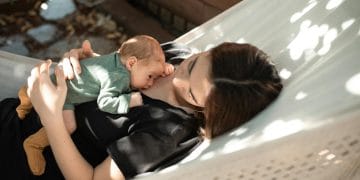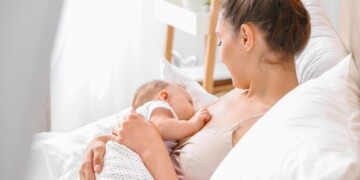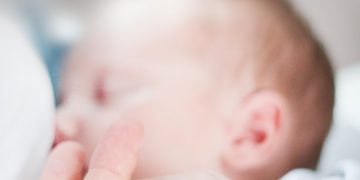There are many things you will be told to avoid after giving birth. This is because some nutrients may transfer to your baby through breastfeeding.
Your milk production may also suffer if you eat things that decrease prolactin levels in your body.
Some people may tell you to avoid eating honey during breastfeeding because it may harm your baby. If you’re wondering whether there is any truth to this statement, you’re in the right place.
Here is all you must know.
Key Notes
- Honey is safe for new mothers, but it should not be fed to babies below age 1
- New mothers must avoid food such as caffeine, fish, alcohol, and artificial sweeteners
- Honey does not have any effect on milk production
- Botulism is a common risk if you feed infants honey
Can You Eat Honey While Breastfeeding?
You can eat honey while breastfeeding because it does not pose any harm to adults. It is best to consume this item in a moderate amount to benefit from the vitamins and nutrients it contains.
The best thing is that honey offers many benefits to your body, such as:
- Antioxidant properties
- Relief from diarrhea and other gastrointestinal conditions
- Promote healing of wounds
- Boosts memory
Remember, honey may also contain botulism spores that can cause the release of toxins on ingestion.
A mother’s immune system is strong enough to deal with spores and remain safe. The best thing is that these spores do not pass to the baby from breastfeeding.
This is why it is safe to eat honey while breastfeeding.
Can You Feed Honey To A Newborn?
Honey has many health benefits, which is why you may wonder if you can feed it to your newborn.
This is not a good idea because of the botulism spores that can lead to botulism in infants.
Your immune system may be strong enough, but a baby’s system is not.
You should not feed honey to your baby if they’re under the age of 1. Waiting will allow the infant’s immune system to develop more so that the baby does not suffer from the risk of botulism.
What Is Botulism?
Botulism is a type of poisoning that is most common in infants. Some people may also tell you that it is exclusive to newborns.
The condition will affect the nervous system of your kid.
Various symptoms can help you identify botulism in your newborn, such as:
- Weak cry
- Constipation
- Trouble swallowing food (the infant may drool a lot while eating)
It will also cause the newborn to suffer from respiratory or breathing problems.
Your kid may also become weak because of the condition. Feeding honey directly is one of the top causes of botulism in infants.
Does Honey Help With Breastfeeding?
It is a common misconception that honey will stimulate your milk production and make breastfeeding easier. The item does not have any effect on your body’s lactating mechanism.
This means honey will not benefit your breastfeeding or harm you.
The only thing it can do is help you enjoy a healthier diet. Medical-grade honey can also offer benefits such as protection from gastric conditions.
You may also have honey if you crave it after pregnancy.
What Foods Should You Avoid While Breastfeeding?
Here are some things you should avoid while breastfeeding to offer more safety to your newborn:
- Caffeine
You may take coffee to stay awake and manage your baby’s needs after pregnancy. This is because the beverage has the potency to make people alert. However, breastfeeding your baby after having coffee can cause the infant to be restless.
This is why new mothers are advised not to have drinks with high caffeine content. Your daily intake should be 200 to 300 mg or less.
- Foods With High Mercury Content
Many types of fish contain high mercury content that can harm your baby’s nervous system. You should avoid tuna, swordfish, king mackerel, and sharks when breastfeeding.
If you have cravings for fish, you can choose options with low mercury levels, such as wild salmon and sardines.
- Alcohol
Alcohol is one of the top things you must avoid during and after pregnancy. It is safe to have one or two drinks per day if you feel like it. This amount will not harm your baby.
However, low alcohol will still change the flavor of your breast milk a bit. Your baby may even refuse to feed if you’re feeding them after an alcoholic drink.
- Artificial Sweetener
Artificial sweeteners may contain chemicals that can harm your baby. The best way to avoid them is by choosing safer alternatives such as honey or maple syrup. Do not feed your baby below age one honey to keep them safe from botulism.
Final Thoughts
This is all you need to know about eating honey while breastfeeding. Honey is safe to eat and will not disrupt your lactation process.




























